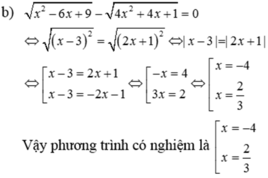Giải các phương trình:
b) x 2 - 6 x + 9 - 4 x 2 + 4 x + 1 = 0
Hãy nhập câu hỏi của bạn vào đây, nếu là tài khoản VIP, bạn sẽ được ưu tiên trả lời.



b.
\(\dfrac{x-1}{2x-1}-1\ge0\Leftrightarrow\dfrac{-x}{2x-1}\ge0\) \(\Rightarrow0\le x< \dfrac{1}{2}\)
c.
\(\dfrac{2}{x-6}-\dfrac{1}{x-8}>0\Leftrightarrow\dfrac{2\left(x-8\right)-\left(x-6\right)}{\left(x-6\right)\left(x-8\right)}>0\)
\(\Leftrightarrow\dfrac{x-10}{\left(x-6\right)\left(x-8\right)}>0\Rightarrow\left[{}\begin{matrix}6< x< 8\\x>10\end{matrix}\right.\)

b, bạn xem lại đề
c, đk : x khác 1 ; 3
\(\Rightarrow x^2-8x+15+2x-2=x^2-4x+3\Leftrightarrow-2x=-10\Leftrightarrow x=5\left(tm\right)\)
d, đk: x khác -3 ; x khác 1
\(\Rightarrow\left(2x+5\right)\left(x-1\right)+x^2+2x-3=4+\left(3x-1\right)\left(x+3\right)\)
\(\Leftrightarrow2x^2+3x-5+x^2+2x-3=4+3x^2+8x-3\)
\(\Leftrightarrow-3x=5\Leftrightarrow x=-\dfrac{5}{3}\left(tm\right)\)

\(b,5x+2\left(x-7\right)=35\\ \Leftrightarrow5x+2x-14-35=0\\ \Leftrightarrow7x-49=0\\ \Leftrightarrow7x=49\\ \Leftrightarrow x=7\\ d,đk:x\ne2;x\ne0\\ \dfrac{x+2}{x-2}-\dfrac{1}{x}-\dfrac{2}{x^2-2x}=0\\ \Leftrightarrow\dfrac{x+2}{x-2}-\dfrac{1}{x}-\dfrac{2}{x\left(x-2\right)}=0\\ \Leftrightarrow\dfrac{x\left(x+2\right)-\left(x-2\right)-2}{x\left(x-2\right)}=0\\ \Leftrightarrow x^2+2x-x+2-2=0\\ \Leftrightarrow x^2+x=0\\ \Leftrightarrow x\left(x+1\right)=0\\ \Rightarrow\left[{}\begin{matrix}x=0\left(kot/m\right)\\x=-1\left(t/m\right)\end{matrix}\right.\)
\(5x+2\left(x-7\right)=35\)
\(\Leftrightarrow5x+2x-14=35\)
\(\Leftrightarrow7x-14=35\)
\(\Leftrightarrow7x=49\)
\(\Leftrightarrow x=7\)
\(\text{Vậy phương trình có tập nghiệm là }S=\left\{7\right\}\)
\(\dfrac{x+2}{x-2}-\dfrac{1}{x}-\dfrac{2}{x^2-2x}=0\) \(\text{ĐKXĐ:}x\ne0;x\ne2\)
\(\Leftrightarrow\dfrac{x+2}{x-2}-\dfrac{1}{x}-\dfrac{2}{x\left(x-2\right)}=0\)
\(\Leftrightarrow\dfrac{x\left(x+2\right)}{x\left(x-2\right)}-\dfrac{x-2}{x\left(x-2\right)}-\dfrac{2}{x\left(x-2\right)}=0\)
\(\Rightarrow x^2+2x-x+2-2=0\)
\(\Leftrightarrow x^2+x=0\)
\(\Leftrightarrow x\left(x+1\right)=0\)
\(\Leftrightarrow\left[{}\begin{matrix}x=0\\x+1=0\end{matrix}\right.\Leftrightarrow\left[{}\begin{matrix}x=0\left(\text{loại}\right)\\x=-1\left(\text{nhận}\right)\end{matrix}\right.\)
\(\text{Vậy phương trình có tập nghiệm là }S=\left\{-1\right\}\)

1: \(2^x=64\)
=>\(x=log_264=6\)
2: \(2^x\cdot3^x\cdot5^x=7\)
=>\(\left(2\cdot3\cdot5\right)^x=7\)
=>\(30^x=7\)
=>\(x=log_{30}7\)
3: \(4^x+2\cdot2^x-3=0\)
=>\(\left(2^x\right)^2+2\cdot2^x-3=0\)
=>\(\left(2^x\right)^2+3\cdot2^x-2^x-3=0\)
=>\(\left(2^x+3\right)\left(2^x-1\right)=0\)
=>\(2^x-1=0\)
=>\(2^x=1\)
=>x=0
4: \(9^x-4\cdot3^x+3=0\)
=>\(\left(3^x\right)^2-4\cdot3^x+3=0\)
Đặt \(a=3^x\left(a>0\right)\)
Phương trình sẽ trở thành:
\(a^2-4a+3=0\)
=>(a-1)(a-3)=0
=>\(\left[{}\begin{matrix}a-1=0\\a-3=0\end{matrix}\right.\Leftrightarrow\left[{}\begin{matrix}a=1\left(nhận\right)\\a=3\left(nhận\right)\end{matrix}\right.\)
=>\(\left[{}\begin{matrix}3^x=1\\3^x=3\end{matrix}\right.\Leftrightarrow\left[{}\begin{matrix}x=1\\x=0\end{matrix}\right.\)
5: \(3^{2\left(x+1\right)}+3^{x+1}=6\)
=>\(\left[3^{x+1}\right]^2+3^{x+1}-6=0\)
=>\(\left(3^{x+1}\right)^2+3\cdot3^{x+1}-2\cdot3^{x+1}-6=0\)
=>\(3^{x+1}\left(3^{x+1}+3\right)-2\left(3^{x+1}+3\right)=0\)
=>\(\left(3^{x+1}+3\right)\left(3^{x+1}-2\right)=0\)
=>\(3^{x+1}-2=0\)
=>\(3^{x+1}=2\)
=>\(x+1=log_32\)
=>\(x=-1+log_32\)
6: \(\left(2-\sqrt{3}\right)^x+\left(2+\sqrt{3}\right)^x=2\)
=>\(\left(\dfrac{1}{2+\sqrt{3}}\right)^x+\left(2+\sqrt{3}\right)^x=2\)
=>\(\dfrac{1}{\left(2+\sqrt{3}\right)^x}+\left(2+\sqrt{3}\right)^x=2\)
Đặt \(b=\left(2+\sqrt{3}\right)^x\left(b>0\right)\)
Phương trình sẽ trở thành:
\(\dfrac{1}{b}+b=2\)
=>\(b^2+1=2b\)
=>\(b^2-2b+1=0\)
=>(b-1)2=0
=>b-1=0
=>b=1
=>\(\left(2+\sqrt{3}\right)^x=1\)
=>x=0
7: ĐKXĐ: \(x^2+3x>0\)
=>x(x+3)>0
=>\(\left[{}\begin{matrix}x>0\\x< -3\end{matrix}\right.\)
\(log_4\left(x^2+3x\right)=1\)
=>\(x^2+3x=4^1=4\)
=>\(x^2+3x-4=0\)
=>(x+4)(x-1)=0
=>\(\left[{}\begin{matrix}x+4=0\\x-1=0\end{matrix}\right.\Leftrightarrow\left[{}\begin{matrix}x=1\left(nhận\right)\\x=-4\left(nhận\right)\end{matrix}\right.\)

d: Ta có: \(\dfrac{x}{x+3}-\dfrac{2x}{x-3}-\dfrac{3x}{9-x^2}=0\)
\(\Leftrightarrow x^2-3x-2x^2-6x+3x=0\)
\(\Leftrightarrow-x^2-6x=0\)
\(\Leftrightarrow-x\left(x+6\right)=0\)
\(\Leftrightarrow\left[{}\begin{matrix}x=0\left(nhận\right)\\x=-6\left(nhận\right)\end{matrix}\right.\)

a: 11x+4=-3/2
=>\(11x=-\dfrac{3}{2}-4=-\dfrac{11}{2}\)
=>\(x=-\dfrac{1}{2}\)
b: \(x^2-9+2\left(x-3\right)=0\)
=>\(\left(x-3\right)\left(x+3\right)+2\left(x-3\right)=0\)
=>\(\left(x-3\right)\left(x+3+2\right)=0\)
=>(x-3)(x+5)=0
=>\(\left[{}\begin{matrix}x-3=0\\x+5=0\end{matrix}\right.\Leftrightarrow\left[{}\begin{matrix}x=3\\x=-5\end{matrix}\right.\)
c: \(\dfrac{x-3}{5}+\dfrac{1+2x}{3}=6\)
=>\(\dfrac{3\left(x-3\right)+5\left(2x+1\right)}{15}=6\)
=>\(3x-9+10x+5=90\)
=>13x-4=90
=>13x=94
=>\(x=\dfrac{94}{13}\)
d: \(\dfrac{2}{x+1}-\dfrac{1}{x-2}=\dfrac{3x-11}{\left(x+1\right)\left(x-2\right)}\)(ĐKXĐ: \(x\notin\left\{-1;2\right\}\))
=>\(\dfrac{2\left(x-2\right)-\left(x+1\right)}{\left(x+1\right)\left(x-2\right)}=\dfrac{3x-11}{\left(x-2\right)\left(x+1\right)}\)
=>3x-11=2x-4-x-1
=>3x-11=x-5
=>2x=6
=>x=3(nhận)

a) ( 4x - 1 ) (x - 3) - ( x - 3 ) ( 5x + 2 ) = 0
<=> (x - 3)(4x - 1 - 5x - 2) = 0
<=> (x - 3)(-x - 3) = 0
<=> x = 3 hoặc x = -3
b) ( x + 3 ) ( x - 5 ) + ( x + 3 ) ( 3x - 4) = 0
<=> (x + 3)(x - 5 + 3x - 4) = 0
<=> (x + 3)(4x - 9) = 0
<=> x = -3 hoặc x = 9/4
c) ( x + 6 ) ( 3x - 1 )+ x2 - 36 = 0
<=> 3x^2 + 17x - 6 + x^2 - 36 = 0
<=> 4x^2 + 17x - 42 = 0
<=> 4x^2 + 24x - 7x - 42 = 0
<=> 4x(x + 6) - 7(x + 6) = 0
<=> (4x - 7)(x + 6) = 0
<=> x = -6 hoặc x = 7/4
d) ( x + 4 ) ( 5x + 9 ) - x2 + 16 = 0
<=> 5x^2 + 29x + 36 - x^2 + 16 = 0
<=> 4x^2 + 29x + 52 = 0
<=> 4x^2 + 16x + 13x + 42 = 0
<=> 4x(x + 4) + 13(x + 4) = 0
<=> (4x + 13)(x + 4) = 0
<=> x = -13/4 và x = -4

Bài 1:
a) (5x-4)(4x+6)=0
\(\Leftrightarrow\orbr{\begin{cases}5x-4=0\\4x+6=0\end{cases}\Leftrightarrow\orbr{\begin{cases}5x=4\\4x=-6\end{cases}\Leftrightarrow}\orbr{\begin{cases}x=\frac{4}{5}\\y=\frac{-3}{2}\end{cases}}}\)
b) (x-5)(3-2x)(3x+4)=0
<=> x-5=0 hoặc 3-2x=0 hoặc 3x+4=0
<=> x=5 hoặc x=\(\frac{3}{2}\)hoặc x=\(\frac{-4}{3}\)
c) (2x+1)(x2+2)=0
=> 2x+1=0 (vì x2+2>0)
=> x=\(\frac{-1}{2}\)
bài 1:
a) (5x - 4)(4x + 6) = 0
<=> 5x - 4 = 0 hoặc 4x + 6 = 0
<=> 5x = 0 + 4 hoặc 4x = 0 - 6
<=> 5x = 4 hoặc 4x = -6
<=> x = 4/5 hoặc x = -6/4 = -3/2
b) (x - 5)(3 - 2x)(3x + 4) = 0
<=> x - 5 = 0 hoặc 3 - 2x = 0 hoặc 3x + 4 = 0
<=> x = 0 + 5 hoặc -2x = 0 - 3 hoặc 3x = 0 - 4
<=> x = 5 hoặc -2x = -3 hoặc 3x = -4
<=> x = 5 hoặc x = 3/2 hoặc x = 4/3
c) (2x + 1)(x^2 + 2) = 0
vì x^2 + 2 > 0 nên:
<=> 2x + 1 = 0
<=> 2x = 0 - 1
<=> 2x = -1
<=> x = -1/2
bài 2:
a) (2x + 7)^2 = 9(x + 2)^2
<=> 4x^2 + 28x + 49 = 9x^2 + 36x + 36
<=> 4x^2 + 28x + 49 - 9x^2 - 36x - 36 = 0
<=> -5x^2 - 8x + 13 = 0
<=> (-5x - 13)(x - 1) = 0
<=> 5x + 13 = 0 hoặc x - 1 = 0
<=> 5x = 0 - 13 hoặc x = 0 + 1
<=> 5x = -13 hoặc x = 1
<=> x = -13/5 hoặc x = 1
b) (x^2 - 1)(x + 2)(x - 3) = (x - 1)(x^2 - 4)(x + 5)
<=> x^4 - x^3 - 7x^2 + x + 6 = x^4 + 4x^3 - 9x^2 - 16x + 20
<=> x^4 - x^3 - 7x^2 + x + 6 - x^4 - 4x^3 + 9x^2 + 16x - 20 = 0
<=> -5x^3 - 2x^2 + 17x - 14 = 0
<=> (-x + 1)(x + 2)(5x - 7) = 0
<=> x - 1 = 0 hoặc x + 2 = 0 hoặc 5x - 7 = 0
<=> x = 0 + 1 hoặc x = 0 - 2 hoặc 5x = 0 + 7
<=> x = 1 hoặc x = -2 hoặc 5x = 7
<=> x = 1 hoặc x = -2 hoặc x = 7/5